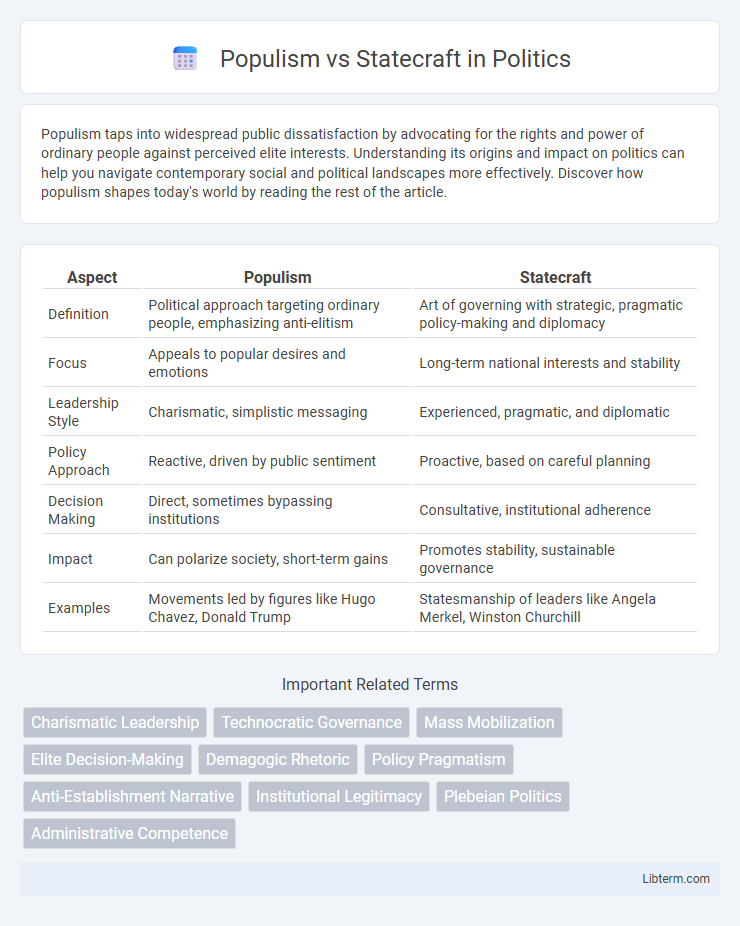Populism taps into widespread public dissatisfaction by advocating for the rights and power of ordinary people against perceived elite interests. Understanding its origins and impact on politics can help you navigate contemporary social and political landscapes more effectively. Discover how populism shapes today's world by reading the rest of the article.
Table of Comparison
| Aspect | Populism | Statecraft |
|---|---|---|
| Definition | Political approach targeting ordinary people, emphasizing anti-elitism | Art of governing with strategic, pragmatic policy-making and diplomacy |
| Focus | Appeals to popular desires and emotions | Long-term national interests and stability |
| Leadership Style | Charismatic, simplistic messaging | Experienced, pragmatic, and diplomatic |
| Policy Approach | Reactive, driven by public sentiment | Proactive, based on careful planning |
| Decision Making | Direct, sometimes bypassing institutions | Consultative, institutional adherence |
| Impact | Can polarize society, short-term gains | Promotes stability, sustainable governance |
| Examples | Movements led by figures like Hugo Chavez, Donald Trump | Statesmanship of leaders like Angela Merkel, Winston Churchill |
Understanding Populism: Definition and Core Principles
Populism defines a political approach emphasizing a direct connection between leaders and the "common people" while often framing elites as corrupt or disconnected. Core principles include the valorization of popular sovereignty, skepticism toward established institutions, and rhetoric that champions ordinary citizens' interests against perceived elite dominance. Understanding populism requires recognizing its dual role as both a critique of existing political systems and a mobilizing strategy that reshapes traditional governance frameworks.
Statecraft Explained: Traditions and Modern Practices
Statecraft encompasses the art of government leadership, combining historical traditions like diplomacy, strategic planning, and governance with modern practices such as data-driven policy-making and digital communication. Rooted in classical political theory, statecraft emphasizes balancing power, managing resources, and fostering national unity to achieve long-term stability and security. Contemporary statecraft integrates technology and global interdependence, evolving traditional methods to address complex challenges like cybersecurity, international alliances, and economic globalization.
Historical Roots of Populism and Statecraft
Populism traces its historical roots to early 19th-century agrarian movements, such as the American Populist Party, which championed the rights of common people against entrenched elites. Statecraft, with origins in ancient civilizations like Mesopotamia and Greece, evolved through strategic governance and diplomacy to maintain order and consolidate power. Understanding these distinct origins reveals how populism often challenges established political systems, while statecraft emphasizes stability and institutional authority.
Populist Leaders vs Skilled Statesmen: Key Differences
Populist leaders often prioritize emotional appeal and direct connection with the masses, leveraging rhetoric that simplifies complex issues to gain immediate popular support. Skilled statesmen emphasize strategic policy-making, long-term governance, and balancing competing interests to ensure stability and institutional resilience. The key difference lies in populists' focus on short-term popularity versus statesmen's commitment to sustainable statecraft and practical problem-solving.
The Appeal of Populism in Contemporary Politics
Populism captivates contemporary politics by directly addressing public discontent with perceived elite detachment and promising swift, clear solutions to complex issues. Emphasizing charismatic leadership and simplified narratives, populism appeals to voters seeking immediate change and representation against established institutions. This contrasts with traditional statecraft, which prioritizes long-term planning, institutional procedures, and pragmatic governance over emotional or ideological mobilization.
Statecraft Strategies: Building Sustainable Governance
Statecraft strategies emphasize the development of long-term institutional frameworks that promote stability, accountability, and inclusive policymaking. Sustainable governance relies on balancing political interests with evidence-based decision-making, fostering resilience against populist pressures. Effective statecraft integrates adaptive policies and robust institutions to ensure enduring social and economic development.
Impact of Populism on Democratic Institutions
Populism often challenges democratic institutions by promoting majoritarian rule at the expense of checks and balances, weakening judicial independence and undermining the autonomy of the press. This erosion of democratic norms can lead to concentration of power in the executive branch and destabilize pluralistic governance. The impact of populism on democratic institutions can result in diminished political accountability and increased polarization within society.
Populism’s Risks: Erosion of Checks and Balances
Populism often undermines the essential democratic principle of checks and balances by concentrating power in the executive branch and weakening independent institutions such as the judiciary and legislature. This erosion fosters authoritarian tendencies, reducing accountability and increasing the risk of governance without oversight. Historical examples demonstrate that the decline of institutional checks under populist regimes frequently leads to democratic backsliding and the erosion of civil liberties.
Balancing Populist Demands with Effective Statecraft
Balancing populist demands with effective statecraft requires integrating popular public sentiment into institutional frameworks without compromising governance stability and long-term policy planning. Effective statecraft employs pragmatic decision-making, leveraging expert advice and constitutional checks to moderate populist impulses that may undermine democratic norms or economic sustainability. This balance ensures responsiveness to citizen needs while maintaining state capacity for coherent policy implementation and national interest protection.
Future Trends: Will Populism or Statecraft Prevail?
Future trends indicate a dynamic interplay between populism and statecraft, with rising global challenges demanding pragmatic governance and strategic policymaking. Populism's appeal may persist in response to economic inequality and social fragmentation, yet sustainable statecraft grounded in institutional resilience and evidence-based decision-making offers pathways to long-term stability. Emerging technologies and geopolitical shifts will further shape whether pragmatic statecraft can effectively counter populist narratives or adapt to incorporate elements of popular engagement.
Populism Infographic

 libterm.com
libterm.com